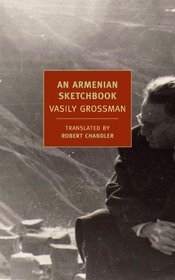Search -
An Armenian Sketchbook
An Armenian Sketchbook
Author:
Few writers had to confront so many of the last century?s mass tragedies as Vasily Grossman. He is likely to be remembered, above all, for the terrifying clarity with which he writes about the Shoah, the Battle of Stalingrad, and the Terror Famine in the Ukraine. An Armenian Sketchbook, however, shows us a very different Grossman; it is notable ... more »
Author:
Few writers had to confront so many of the last century?s mass tragedies as Vasily Grossman. He is likely to be remembered, above all, for the terrifying clarity with which he writes about the Shoah, the Battle of Stalingrad, and the Terror Famine in the Ukraine. An Armenian Sketchbook, however, shows us a very different Grossman; it is notable ... more »
ISBN-13: 9781590176184
ISBN-10: 1590176189
Publication Date: 2/19/2013
Pages: 160
Rating: 1
ISBN-10: 1590176189
Publication Date: 2/19/2013
Pages: 160
Rating: 1
5 stars, based on 1 rating
Publisher: NYRB Classics
Book Type: Paperback
Other Versions: Hardcover
Members Wishing: 4
Reviews: Amazon | Write a Review
Book Type: Paperback
Other Versions: Hardcover
Members Wishing: 4
Reviews: Amazon | Write a Review
Genres:
- Biographies & Memoirs >> Memoirs
- History >> Asia >> Armenia
- History >> Europe >> Eastern
- History >> Russia




